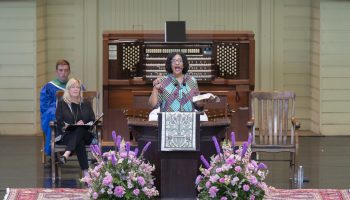“Please forgive the intrusive nature of this sermon. It is not my right to initiate a visit to the attic of your soul, and even to suggest the climb into the attic is rude,” said the Rev. Robert Allan Hill at the 9:15 a.m. Thursday morning worship service in the Amphitheater.
His sermon title was “Forgiven” and the Scripture reading was Luke 7:36-50, the woman with the alabaster jar.
Like Virgil with Dante, guiding the poet through the levels of hell, purgatory and heaven, Hill acted as a guide through the attic of the soul.
“The Gospel intrudes on the soul and truth steadily advances on us,” Hill said.
Hill walked the congregation, figuratively, up to the second floor, turned on the hall light and pulled down the chain that opened the porthole to the attic. Most of us, he said, had not been to the attic lately; there were mothballs and the coverlets of personal history.
In one corner was a uniform from World War I, a pair of bobby socks and an “I like Ike” button, three Beatles albums — Greatest Hits, Abbey Road and the White Album — a Jim Croce tape and photographs. Who are those people in those photographs?
“We will leave the wardrobe for another day because only lions and witches come from wardrobes,” Hill said.
Back in the corner is a small, low box tied with baler twine that no one else knows is here, but “you know, remember, understand and care.”
“Regret” is the word written on top of the box, “a short synonym for hell.”
Hill told the congregation to open the box, untie it and let all that was in it fall out. He called it a “gutsy” thing to do. To have regrets is part of being human. Can you live with being human, of being a little lower than the angels?
“I know because I have boxes in my attic and I make this climb seldom,” he said. “I know about ‘if only,’ not just vicariously.”
Hill said that he asked to journey with the congregation to have the opportunity for healing.
“I truly doubt that anything in your box will surprise me; it is your regret, your attic, and it is different from mine,” Hill said.
He called the box a “box of impeachment brought against us,” but the laws of the soul don’t give way to “lawyerly cunning.” Even if we try to believe that we have never said a cruel word or had a myopic judgement, “the box does not lie, nor does the conscience or life.”
Yet there is a word that must be spoken.
“It is a God word, and only God speaks God words,” he said.
If you don’t remove what is festering, it will cripple you, Hill told the congregation.
“ ‘God forgives you’ is the divine promise and intuition,” he said. “Jesus taught us to pray for it. John Wesley asked his pastors, ‘Do you know God to be a pardoning God?’ ”
This is good news in the face of a box of regrets. It is sometimes hard to hear “God forgives you,” but if you know that God is a pardoning God, then God has known you in Jesus Christ.
Hill said there were several verses that the congregation should remember. In the Lord’s Prayer, Jesus taught “forgive us our sins as we forgive those who sin against us.” When Peter asked if he should forgive someone seven times, Jesus told him 70 times seven. Paul wrote that Christians should be kind, tender-hearted, forgiving as God in Christ has forgiven them.
The second piece of good news is that other people are more willing to forgive than one might know or expect, Hill said.
“You may have to ask and say ‘I’m sorry,’ ” he said, “but most people, when confronted with a heartfelt apology, will willingly say, ‘Don’t worry, I forgive you.’ ”
But what might hold people back most from accepting forgiveness is the ability to forgive oneself.
“You have to let yourself off the hook; you are not 101 percent perfect,” Hill said. “Theologian Paul Tillich said that you have to ‘accept your own acceptance.’ ”
He asked the congregation to travel light toward a common hope. When in doubt, throw it out. Forgive yourself, take the box of regrets out to the curb and “let the heavenly garbage truck haul it away for good.”
“I forgive you, you forgive me,” Hill said. “As William Blake wrote in his poem ‘Broken Love’: ‘And throughout all Eternity, I forgive you, you forgive me.’ ”
The Rev. Carmen Perry presided. Cindy Hinsdale read the Scripture. Hinsdale calls Chautauqua County home. She is a member of Hurlbut Memorial Community United Methodist Church, where she delivers the children’s moments during the morning worship service and serves on the Nurture Committee. The other 10 months of the year, she works as a teacher’s aide at Sherman Central School. During the Chautauqua season, she lives and works in the Literary Arts Center at Alumni Hall. This is her first summer as the building manager. The Motet Choir sang “O Lux Beatissima” by Howard Helvey; Jared Jacobsen, organist and coordinator of worship and sacred music, directed the choir. Gary and Willow Brost provide support for this week’s services. For the Wednesday morning worship service, Hill asked Jared Jacobsen if, since his sermon was titled “Sweet Chariot,” Jacobsen could incorporate a bit of that tune somewhere in the service. Jacobsen decided to go one step further and have the Motet Choir sing an anthem by the title “Swing Low, Sweet Chariot,” arranged by Dale Adelmann. However, they were all sworn to secrecy in order to surprise Hill. To further hide the surprise, Jacobsen made up the title “Dulcis Sinum Currus,” which, translated from Latin, means “Sweet Chariot.”





